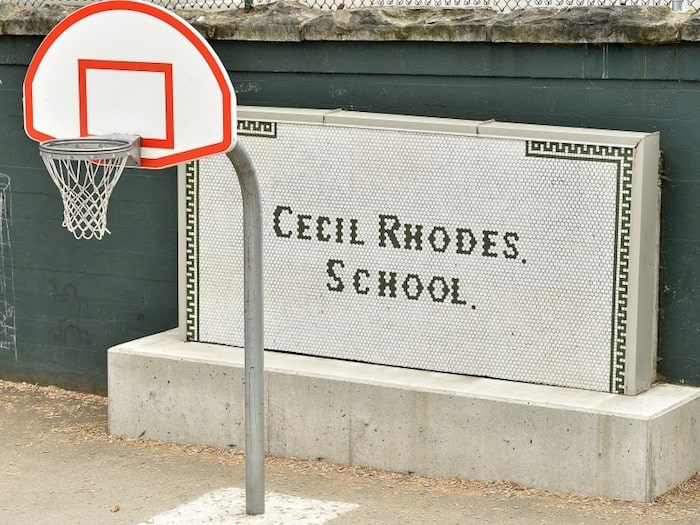Vancouver school trustees voted unanimously to remove a controversial sign from a West Side school June 24, but not before a generational divide seems to have split current and past school communities.
A sign at L’Ecole Bilingue bearing the name of 19th century mining magnate Cecil Rhodes will be removed immediately after two weeks of discussion among trustees and the neighbouring communities.
Built between 1910 and 1912 near Oak Street and 14th Avenue, the school was known as Cecil Rhodes School until the mid-1970s.
 This plaque commemorating Cecil Rhodes will be taken down immediately from L’Ecole Bilingue elementary school after trustees voted unanimously in favour of its removal June 24. Photo by Dan Toulgoet/Vancouver Courier
This plaque commemorating Cecil Rhodes will be taken down immediately from L’Ecole Bilingue elementary school after trustees voted unanimously in favour of its removal June 24. Photo by Dan Toulgoet/Vancouver Courier
A tile plaque, made from a portion of the old school which was demolished several years ago to make way for a new school building, went up near the new school’s basketball court in 2017 to recognize the school’s former name and the former building’s heritage status.
Born in England in the mid-1800s, Rhodes helped found the De Beers diamond trade and was a figure of tense political disdain in South Africa. Rhodes has been quoted in various publications, including the BBC, as having stated that the English were a master race and therefore entitled to vast wealth and land.
Some have linked his political influence and wealth as contributing to Apartheid in South Africa. A scholarship created after Rhodes’ death — known as the Rhodes Scholarship — is given to international students to this day, allowing them access to education at Oxford University.
OneCity trustee Jennifer Reddy’s June 10 notice of motion asking for the plaque to be removed was met with broad support from the current school community and from others with kids in nearby schools.
“Cecil Rhodes does not represent the values of our district nor contribute to the wellbeing of students, staff, families, and communities in our district,” Reddy said June 10. “Any further upholding of names like CR in our district make us complicit in his legacy.”
Karen Tsang has three kids enrolled at Lord Byng and Charles Tupper secondary schools, and another at General Brock elementary.
“We are seeing monuments to British imperialism and white supremacy come down all across the globe,” Tsang wrote to trustees. “This is a good thing as it is a true path to living in harmony with those who’ve been horribly harmed.”
Tsang’s sentiments were echoed time and again at a June 19 committee meeting and in the days since Reddy’s initial motion two weeks ago.
“I take my young son to play at the playground there very often, and I was horrified to learn that the tile plaque I’ve taken hundreds of pictures in front of commemorates such a vile human being,” added Fairview resident Stacey Hamilton.
Some who attended the school while it still bore the name of Rhodes were opposed to the plaque coming down. Some suggested the plaque’s removal is a mistaken attempt at trying to rewrite history, while others feel a sentimental tie to the name because of their time at the school.
Beverly Bjarnason attended the school from 1956 to 1961. Her written correspondence to trustees suggests Rhodes’ name carries positive memories for her time at the school and for her fellow classmates.
“lt is always a slippery slope to try to erase history because if we fail to learn from history we are doomed to repeat it,” Bjarnason wrote. “This history is of a great elementary school, great teachers, great memories and we will be happy to share them with you and speak up for this tiny remnant of our history. Just because Cecil Rhodes himself is not what we think of now as a role model, our elementary school was.”
Former student Lynn, née Leonard, added this:
“That piece of flooring from the entry to the school is not about the imperialist Cecil Rhodes, it’s about a wonderful place of education and memories,” Leonard wrote. “Could we not just take a deep breath and let it be?”
Fellow Rhodes alumnus Peter Teevan said past school members have been branded as racists since the debate took off earlier this month, adding that his time at Rhodes was “multi-cultural and loving.”
“To me, so far, this looks like a series of decisions only motivated by anger and judgement,” Teevan wrote to trustees. “l don’t pretend that Rhodes, the man, didn't deserve it. But I wasn’t alive then, nor were those wanting this change. Why am I condemned for the sins of another?”
Several motions were introduced Monday night relating to the Rhodes renaming and school naming policies in the larger context. Anti-racist and reconciliation measures were also touched on, including a move that will see trustees only considering place-based names for new schools in the city.
Green trustee Lois Chan-Pedley introduced a notice of motion calling for a “colonial audit” aimed at improving board policies around reconciliation and anti-racism. Her motion asks for an interim staff report be returned to trustees by May 2020.
Trustees also approved an additional name for Crosstown elementary that will go into effect in time for the next school year. The move was made to incorporate a First Nations name into the school community.
Taken from the hən̓ q̓ əmin̓ ə language used by both the Musqueam and Tsleil-Waututh First Nations, Crosstown’s additional name šxʷwəq̓ʷəθət references a mode of transportation used by the Musqueam. First Nations specifically used tidal patterns as a short cut to get between False Creek and Burrard Inlet.
The name was arrived at after consultation with the school’s PAC, students and members of the Musqueam Indian Band.
A school district staff report translated the school’s additional name as “the place from which one can catch the tide.”



